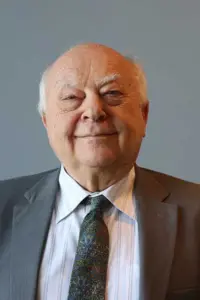
For Katie Tucker, BCL/LLB’07, and Zachary Davis, BA ‘04, BCL/LLB’09, presenting in front of the Supreme Court of Canada was nerve-wracking and exciting in equal measure. One called it “fun,” the other might not have chosen that word, but they agreed it was an honour. Tucker recalls an experienced lawyer advising, “If you’re not nervous, you’re a fool.”
Tucker and Davis, both with the firm Pape Salter Teillet, had this opportunity when the Attorney General of Quebec challenged the constitutionality of the 2019 Act respecting First Nations, Inuit and Métis children, youth and families. The federal Act provides Indigenous communities with control over their children’s welfare. Quebec said it trod on the toes of provincial jurisdiction. Tucker represented respondent Makivvik; Davis represented the intervenor Listuguj M’gmaq Government.
Pleading before Canada’s highest court is an exercise in concision. Months and months are spent carefully crafting a factum of a dozen pages, sometimes more, which must then be condensed into a 5 or 10-minute intervention.

Tucker relished the time to grapple with big questions. If a case is in front of the Supreme Court, “it’s probably not settled and is very intellectually interesting and exciting,” she says. “This case in particular raised significant constitutional and Indigenous law questions of great importance to Indigenous Peoples and the reconciliation process.”
At court, there’s plenty of pomp and ceremony – the justices are decked in mink, after all – but Davis was impressed by how quickly everyone gets down to business. The doors open, “The court!, La cour!” is announced ringingly, the justices file in, sit down, and start. There’s none of the usual throat clearing, housekeeping and chit-chat that can occur in lower courts. “You get the sense that time with the Supreme Court is very, very precious,” says Davis.
Tucker presented on the first day, thoroughly prepared on the controversial aspect of the case she’d chosen to focus. She launched into her oral argument and was interrupted by a question from a judge, “almost immediately.”
“I got about ten seconds into my carefully crafted speech, in which I had vexed over every word and BOOM! It didn’t matter at all anymore,” Tucker recalls.
“The tricky bit was trying to say what I wanted to say while answering,” she adds. Judges only ask about what they’re interested in or bothered by. “You have to take that very seriously and honour their questions. If they’re taking you off course, it’s because they feel there’s something to be answered.”
Davis had only short notes for his presentation because his intervention was happening on the second day. “For about a day and a half, as I was listening to what was going on, I was writing and rewriting until it was my turn.”
“The real challenge is whittling down to something that can be effectively said in five minutes in a way that might influence the decision,” Davis says, and being very attentive to how the argument is developing. “Because the relevant issue, by the time it’s your turn to speak, may not be what you thought it was.”

This wasn’t his first stint at the Supreme Court. In 2013 when his boss got sick, Davis had to step in to represent the Grand Council of Treaty # 3 as intervenor in Grassy Narrows First Nation v Ontario. “I got that sort of airy weak-kneed feeling. You modulate your breath, you get into it, and you’re okay!”
He recalls then Chief Justice Beverley McLachlin quickly zeroing in on him. “She was just brilliant,” he says. “If there is a weakness in the argument, one of the nine is inevitably going to point it out to you,” he learned.
This time around, Davis presented virtually. Though less nervous, he found it more difficult to engage the panel. He’s impressed by lawyers who can do so through screens from afar.
Davis likes a narrative approach. He cites the example of a litigator who was talking about modern treaties. The Crown thinks of a treaty like a divorce, an arrangement that means the parties won’t have to talk to each other again, the lawyer had argued. First Nations, instead, look at a treaty like a marriage, something to be cultivated and worked on. Davis was impressed by the impact of starting with an analogy, and returning to it at the end. “People will remember an image,” he says.
In the proceedings, Tucker loved the chance to meet lawyers representing Indigenous groups across the country. She found collegiality, shared passion, and warmth. “Just making friends! It was a real bonding experience.”
A bonus for Davis was seeing his former professor of civil law on the bench. Justice Nicholas Kasirer, BCL’85, LLB’85, was dean of the Faculty of Law from 2004 to 2009. “I tried to think back to his teaching style, how he was as a writer, a jurist – could I speak to those qualities? I’m not sure I managed, but it allowed me to psychologize the Court a bit.”
In February 2024, in a unanimous judgment, the Supreme Court ruled that the Act respecting First Nations, Inuit and Métis children, youth and families was constitutionally valid and dismissed Quebec’s appeal. The decision was seen as a win for Indigenous self-government. “It’s an honour to represent Indigenous peoples before the Supreme Court,” Tucker says. “It was stressful, but important.”
Words of a Supreme Court Veteran
For most litigators, pleading before the Supreme Court of Canada is a once-in-a-lifetime experience. Julius Grey is one of the very few lawyers in Canadian history who can say they’ve done it over 50 times – and counting. Though the routine is now familiar, he still gets nervous. The experience “strikes awe into you no matter at what stage you are,” he says.

Grey’s inaugural case wasn’t remarkable, but he vividly recalls his first visit to see the Court in action. “Justice [Louis-Philippe] Pigeon, who was not always very polite, bawled out a lawyer from Quebec who didn’t know some of the technical. I was scared stiff!”
Early in his career, Grey learned a judge’s mind is very rarely changed during the pleadings. Grey recalls chatting over coffee with a judge about to retire who, when asked how often the oral argument swayed the case, replied, “In about 20 years on the bench? Once.” Grey says, “The factum is your real shot. Much more than pleading.”
Grey reads the bench. He’s familiar with the judges and their philosophies. “You usually know if a case is totally against you or totally for you,” Grey says. “If you’ve got a freedom of expression case, if either Justice [Morris] Fish or Madame Justice [Beverley] McLachlin isn’t with you? Forget it! You’ve lost,” he laughs. “Just enjoy your ride.”
In court, Grey gauges how judges are likely to vote and addresses the hesitant middle. There’s no point in pitching your argument to someone who agrees with you 100%, Grey says. “So what if you get a few smiles from him or her?”
Repeat visits to the SCC means Grey can draw on previous experience. Syndicat Northcrest v Amselem (2004 SCC 47) discussed whether building a temporary religious hut, a succah, on a balcony violated a condominium contract. Grey, arguing successfully for Amselem, noted that Justice Ian Binnie was very attached to the contract and had voted against him. So, two years later, when Grey argued in Multani v. Commission scolaire Marguerite Bourgeoys (2006 SCC 6) on the right to carry a kirpan to school, he started by saying, “In Amselem, Justice Binnie dissented the freedom of contract in private law. I want to stress this is public law, this is a school!” Well, Binnie immediately interrupted, “This doesn’t have anything to do with my dissent in Amselem!” Grey chuckles. “Then I knew he was with us…”
Though Grey emphasizes policy, sometimes he argues consequences, recalling a case on cutting elementary school pensions. To do so would create a gender inequality, given how many pensioners are women in their 80s, he argued. “You have to protect the recipient.”
And happily, even after all these years, Grey can say, “I never ended up being bawled out. There was always considerable respect, even with the ones who didn’t agree with me.”

